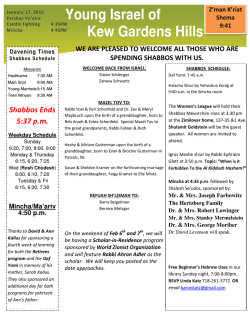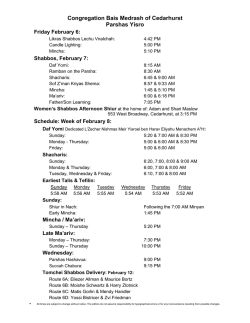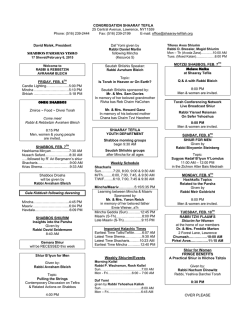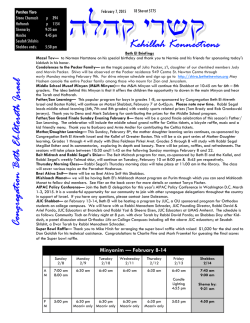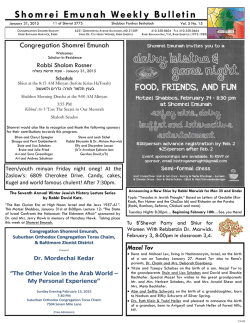
Parshas Beshalach - Congregation Bais Yisroel
Mazel Tov to Rabbi & Rebbetzin Moshe Tuvia & Beyla Lieff on the engagement of their son Sruli to Chayala Epstein of New York. Mazel tov to the entire mishpacha. May the wedding take place b’shaah tovah u’mutzlachas. Mazel Tov to Mr. & Mrs. David & Hela (Zedaka) Nathan on the birth of triplets: Adina Chava, Shira Rochel & Emunah Layah. Mazel tov to the entire mishpacha. May they grow to Torah, Chupa and Ma’asim Tovim Fri Erev ShabbosParshas Yisro Feb 6 Shacharis 6:30 AM Mincha 5:10 PM Light Candles 5:10 PM Mazel Tov to Rabbi & Mrs. Eli Kutoff in Miami on the birth of a daughter, Shabbos Feb 7 Shacharis 8:30 AM Latest Shema (MG”A/GR”A) 9:20/9:56 Latest Shemona Esrei (GR”A) 10:47 BNOS 2-3 PM / Pirchei 3:55 PM Sifrei Chafetz Chaim, – Rabbi Roberts 4:25 PM Mincha 4:55 PM Shabbos Over 6:20 PM Avos U’banim 7:20 Nechama Miriam. Mazel tov to grandparents Mr. & Mrs. Daniel & Perri Kutoff and great-grandmother Mrs. Bertha Kutoff. May she grow to Torah, Chupa & Ma'asim Tovim Mazel Tov to Menachem & Ayelet Felman on the bris of their son, Noam Elimelech. Mazel tov to the entire mishpacha. May he grow to Torah, Chupa & Ma’asim Tovim Mazel Tov to Rabbi & Mrs. Tzvi Lichtman on the birth of their daughter, Bashie. Mazel Tov to the entire mishpacha. May she grow to Torah, Chupa & Ma'asim Tovim. The Kehilah extends condolences to Mr. Gary Novik and family on the passing of Mrs. Luiza Novik, Gary’s wife. HaMakom y'nachem eschem b'soch shaar aveilei tzion v'Yerushalayim This Shabbos there will not be Pirchei, nor Hilchos Shabbos shiur Men & Boys Shoreview Swim Motzei Shabbos, $14/ea, 8:30-10:30 PM Sha’arim presents: Gateways To Learning - 16Th Annual Auction featuring a fabulous Gateways to the World Buffet. Sun, Feb. 8th - 6 PM Auction & Buffet, 8 PM-Raffle & Drawings. Sabes JCC. Admission at the door is $36 Save the Date: Feb 25 for the Minnepolis Kollel Pre-Purim Ladies Event The Clothing Connection gemach is looking for someone to take over the baby and/or children's clothing depts to serve our growing community! If interested, please call 952 929 9769. In memory of Dr. Michael Zuckman, Mordechai Avraham ben Elimelech ,a”h, the following is suggested. The family would appreciate if you would share your thoughts and memories about Dr. Zuckman, email [email protected] or bring/mail to the Zuckman home 2650 Raleigh Ave. Mpls, MN 55416. 3. A special tzedaka fund is being created l’ilui nishmas Dr. Michael Zuckman. To contribute, please make checks out to the Bais Yisroel Tzedakah Fund. (Please note, “Dr. Michael Zuckman”) Ongoings Goings-On Frankel’s World of Judaica Hours Sun & Fri 11‐ 1:30 pm & Mon‐ Thurs 12‐6 pm Torah Academy Store: Thurs 8:30—10:30 PM •Gemachim Info—call Bella Smith 952-927-9670 The Kollel Korner • Minchas Chinuch –Sun 8 AM with Rabbi Chaim Gibber • Class for Women on Nevi'imP:Sefer Yehoshua with Rabbi Eliyahu Stern Tuesdays 2-2:45 PM @Kollel • Partners in Torah Tues 8:15 PM @ Kollel • Business Halacha: Ribbis in the workplace. Every Wed 8-8:30 AM upstairs at the Kollel, by Rabbi Stern •Women’s Tehillim: Mons @ 8:15 AM at Perri Kutoff's Home or 9:15 PM at Engelson’s home, Tefilla Class-Birchos Krias Shema with Mrs. Tzipora Greenberg-Wed. 12-12:45 PM at her home. •Shatnez Lab, 4201 Sunset Blvd. back door, Yoel Menashe Jeff Kreps, 612-868-3330 Davening @ Yeshiva of Mpls Shacharis is 7:40 Mincha 1:45 Maariv 9:05 •Jr. Mussaf Minyan for boys grades 5-8 •Mincha Program Grades 4-8 To add a name to the Mi Sheberach L'cholim list, call 917-753-7057 or email [email protected] •Jewish Library: Please circulate/donate children & teens! Jewish books. Th 4-5 PM & Sun 10-11 AM @ the Sherman home. Contact Juli Sherman 952.926-0334 •Baby Gemach -soralasbabygemach.com •Order a Shtender: Call the shul office. Cost: $250. • Clothing Connection Gemach 952-929-9769 Tomchei Shabbos helps families w/ basic Shabbos necessities. Contact Rabbi Greenberg if you know of anyone who could use this assistance, or wants to sponsor. Sponsorship $35-week/ $150/ mo. Volume 10: Issue 14 Parshas Yisro 18 Shevat, 5775 February 7, 2015 Parshas Yisro Sunday Feb 8 Earliest Bracha on Tallis Sun-Fri 6:44 AM-6:37 AM Shacharis 7:00 & 8:00 AM Mincha 5:15 PM Mon-Thurs Feb 9-12 Shacharis 6:30 AM Mincha 5:15 PM Fri Erev Shabbos Parshas Mishpatim Feb 13 Shacharis 6:30 AM Mincha 5:20 PM Light Candles 5:20 PM Good Shabbos! Schedule of Shiurim at Bais Yisroel Likras Shabbos, BOYS 5-8 Fri 30 min before Mincha Daf Yomi Sun, after Maariv, M-F after 1st Shacharis & during Shalosh Seudos Gemara Shiur-Mesechta Shabbos w/ Rabbi Weinberg M-F following 6:30 Shacharis Amud Yomi with Rabbi Greenberg (see above) Sun-Thurs 9:15-10 PM Mishna Brurah with Rabbi Weinberg ½ hour before Shacharis Sun thru Fri Bais Yisroel Shabbos Observer is a weekly publication that brings you Divrei Torah on the weekly parsha & community events. To submit items for publication please contact the Office by Thurs 11 AM, of each week. For general information regarding activities, events or membership please contact the shul office or HaRav Yechezkel Greenberg. To receive the BYSO by e-mail, please send an email to [email protected] HaRav Moshe Tuvia Lieff, Shlita, Founding Morah D’asra (1990-2009) Arnie and Hindy Frishman: Founding BYSO Editors Congregation Bais Yisroel 4221 Sunset Boulevard Minneapolis, MN 55416 Phone: 952-926-7867 Hall Phone 952-926-0518 Ext 4 [email protected] [email protected] Webpage: www.baisyisroel.org The first of the men's series of Shovavim Shiurim was given this past week by Rabbi Greenberg. See flyer inside for the full schedule of both men's and women's shiurim HONORING THE SHABBOS: REWARDS AND CONSEQUENCES During davening each Shabbos morning we say in the Shemona Esrei, “And [Moshe] brought down in his hand two stone Luchos (Tablets) [from Har Sinai], and it was written in them about observing Shabbos.” The Chasam Sofer (in his Drashos work) asks that since it specifies that Moshe brought down two Luchos, the word “them” in the second half of the phrase seems to be incorrect; Shabbos was written on only one of the Luchos! In answer, he quotes from Rashi (Shir Hashirim 4:5) that each of the five Dibros on one side of the Luchos corresponds to its counterpart on the opposite side. Therefore Shabbos corresponds to Lo Sa’aneh, meaning that transgressing the Shabbos is tantamount to testifying falsely by saying in effect that Hashem did not create the world in six days. On the other hand, one who does sanctify the Shabbos testifies that Hashem created the world Yeish Me’ayin (ex nihilo — out of nothing). How does keeping Shabbos equate to testifying specifically to this idea? R’ Shamshon Rafael Hirsch explains the connection is that the Melachos (39 labors) that are forbidden on Shabbos are all actions that represent man’s attempt at mastery over creation. There is a constant danger that man will forget that he is fully dependent on Hashem for the abilities with which he was endowed. The reason we rest on Shabbos is to demonstrate our recognition that everything we have is from Hashem. By refraining from work one shows that he believes that Hashem is the One Who provides his needs. Shabbos is a day that we should look forward to, and prepare for, all week. Shabbos was part of Rav Yosef Chaim Sonnenfeld’s essence; from Sunday to Friday he was focused on how to better honor the Shabbos. Although he always walked with a walking stick on weekdays, his custom was that on Fridays he would not use the stick. He reasoned as follows: “Since I use a stick all week, if I don’t use it only on Shabbos, it will detract from my Oneg Shabbos. Therefore I will get myself used to walking without a stick each Friday; so that when Shabbos arrives I won’t feel that I’m lacking anything.” Shabbos is a day that was given to us for the purpose of connecting with Hashem. There is a Mitzva of Oneg; to have physical pleasure with good food and wine. During the week the Neshama (soul) and Guf (body) pull us in different directions; one wants spirituality while the other craves physical indulgences. On Shabbos, since eating is a Mitzva, Rashi (Beitza 16a) tells us that the Neshama is not repelled by the food intake of the Guf. There is peace between the two (thus the term “Shabbos Shalom”), allowing for the Neshama to focus unhindered on Ruchniyus (spirituality) and its relationship with Hashem. We must take advantage of this “peace” and make the most of Shabbos, making use of every moment of the day. Perhaps one can make a little extra time for learning Torah. The free time we have because we are resting from work is meant to be used for Ruchniyus, and since our Guf is “satisfied,” it allows us to. The Shabbos table is a most important vehicle to give over this Emunah and Bitachon to (ourselves and) our children. It should be utilized properly, with Divrei Torah being said, Zemiros being sung, and of course learning some Hilchos Shabbos, as opposed to other less spiritual pursuits. [May we suggest learning the weekly selection from The Shabbos Kitchen as part of the current community-wide initiative to strengthen ourselves in the knowledge of Hilchos Shabbos?] Before World War II, R’ Chuni Scheinerman was a young American bochur studying in Yeshiva in Europe. He once had to be in Warsaw on Friday afternoon to update his papers, without enough time to make it home for Shabbos. He rented a hotel room in a nearby town, and as was required he went to register at the city office. Not 10 minutes after he returned to his room there was knock at his door, and he opened to find a Chossid, the Gabai (attendant) of a well-renowned Rebbe, who said the Rebbe is here in town for Shabbos and would like to speak with you. “Me?! I’m a Litvishe American boy! What could he want from me? There must be some mistake.” But the Gabai insisted there was no error, so he went to see the Rebbe. The Rebbe told him, “I’d like you to marry my daughter.” His first response was similar to his response to the Gabai, but eventually he agreed to go out with her. “No,” said the Rebbe. “You must get married without going out.” That he did not agree to, and eventually they settled and the Rebbe allowed them to go onto the porch and have a talk. The girl asked him, “What did your Shabbos table look like at home?” He wasn’t sure what she was driving at, but answered, “Well, we made Kiddush and Hamotzi, and during the meal we sang Zemiros and said Divrei Torah on the Parsha.” “Now I know why you remained frum,” was her response. “In our home my father is busy with the Chassidim and the women basically eat by themselves, and I lost my interest in Yiddishkeit.” He realized then that the Rebbe had hoped that if she would marry a more modern American boy, perhaps her interest would be reawakened. When he returned to America he went to R’ Moshe Feinstein and related the story. R’ Moshe replied, “It’s a Mitzva to publicize the story (although you’re not allowed to repeat the name of the Rebbe) Hatmana so that people realize how important the Shabbos Seuda is for Chapter 6 Pgs. 74-78 the Chinuch of one’s children.” Helpful Halacha Highlights (#28) (Excerpted from Halacha at Mincha/Maariv) 1. One should keep his feet together as he davens Shemona Esrei. This is in order to be comparable to Malachim (angels) who appear to have a single foot. 2. Even one who is forced by circumstances to daven while sitting (e.g., on an airplane), should keep his feet together. (In such a case one should also sit upright in a respectful fashion, not lounging back in a carefree way.) 3. One’s posture should be with his head bowed slightly, with his eyes closed, so that he not see anything that may disturb his concentration on his Tefillah. If one feels that he is losing his concentration, though, he should glance momentarily out the window at the heavens to remind him of Hashem and to help return his concentration. This is one of the reasons for the Halacha that a shul should have windows. 4. One may look into a Siddur if he needs to, but he must be careful not to glance elsewhere during Tefillah. 5. One should daven quietly so that only he can hear what he is saying. One should NOT allow his davening to disturb others who are nearby. 6. One should not lean on anything while davening. Only if needed, one may lean a bit, but only to the extent that if the item he is leaning on is pulled away he would not topple over. One who is older or not well and can’t stand unaided, may lean as necessary. He may even sit, or lie on side if he cannot daven otherwise.
© Copyright 2026
